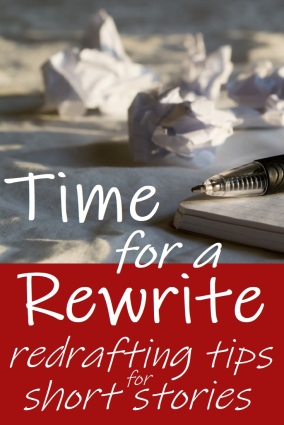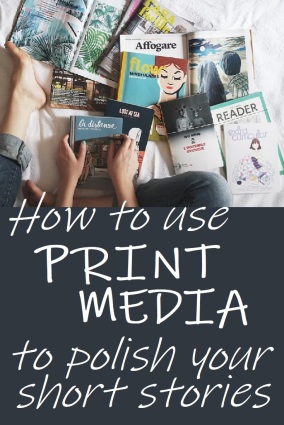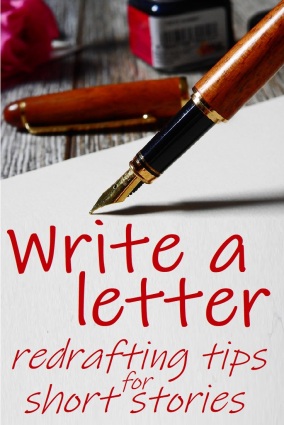Tucked into a bookshelf in my spare-room is a red cardboard envelope folder with creased corners and Ideas scrawled on the front in thick, black marker pen. Inside is a motley sheaf of papers. A4 foolscap rubs shoulders with blue Basildon Bond and old, used envelopes hold hands with pages torn from spiral-bound journalist pads. Every piece is covered with my handwriting. When it comes to the used envelopes, every centimetre is covered.
These are some of the brainwaves I’ve had for short stories. Some are skeleton frames of an idea, others are full outlines with a bonus thrown in of the opening paragraphs. One or two are complete first drafts that have languished unloved in the file waiting for some attention to polish and shine them for an audience.
Some of this writing stash might never progress beyond the scrawled notes because on rereading, it turns out to be less brainwave and more brain fart. But most of it is worth developing. And not only have those first drafts been very patient waiting for that development (one is at least 5 years old), but also there is a deadline fast approaching for a short story competition I want to enter. Who wouldn’t like the chance to win $5,000?!
 Last week when I saw an advert for the competition, I pulled out one of the stories. In its first-draft shape it was like a rough-hewn piece of wood masquerading as a sculpture. This week I’ve sanded and polished it into something much more beautiful – paring bits, rewriting bits, inserting more detail or cutting irrelevant guff. It’s not finished, but I like to leave work marinating for a time before doing a final read over and edit.
Last week when I saw an advert for the competition, I pulled out one of the stories. In its first-draft shape it was like a rough-hewn piece of wood masquerading as a sculpture. This week I’ve sanded and polished it into something much more beautiful – paring bits, rewriting bits, inserting more detail or cutting irrelevant guff. It’s not finished, but I like to leave work marinating for a time before doing a final read over and edit.
While I was working on it, notes jotted in the margin in a different colour ink reminded me of ways of crafting later drafts of stories that I’d learned at a writing workshop by Vivienne Plumb, a New Zealand poet, playwright and author. She shared some great suggestions, and I have subsequently added more of my own ideas for writing short stories, such as character development, enriching themes and meanings in stories, and writing dialogue.
These are effective methods both for writing a story from scratch, and reworking subsequent drafts.
1) Read
If you want to write short stories, read short stories.
Many of them, by different authors, in different genres.
The more you read, the more you see what works – and what doesn’t!
2) Elements
Keep a record of what you need to consider when writing short stories, such as:
Theme and content
Form
Narrative voice
Character – POVs (point of view)
– wants, needs and motivation
– personality and behaviour
– age, lifestyle, beliefs
Plot
Conflict
Dialogue
Key events and climax
Atmosphere and mood
Setting – place and time
Imagery and symbolism
Presentation – tense, punctuation, format
3) Tools for Shaping Your Story
PRINT MEDIA
 Collect shopping and library receipts other people leave behind.
Collect shopping and library receipts other people leave behind.
Look at the items listed on them and write a brief description/ list of characteristics of the person you think would buy those items or read those books.
Develop this list into a scene for a story.
You can do this to create a character/scene for a brand new story, and/or to develop an existing story.
Collect photos of people from magazines, newspapers, online etc.
Write a two-page story (around 500 words), starting with a line of dialogue spoken by one person to another in one of the photographs.
What is the relationship between the people, what are they talking about, how are they talking to each other?
Why are they together, what are they doing?
Old knitting and dress-making patterns can also be good for this exercise.
Collect news items and use as the basis for a short story.
Holiday brochures, real estate advertising, leisure activity pamphlets, National Geographics can help you write an authentic sense of place in your story.
Hairstyle design catalogues and clothing catalogues are great sources for writing physical descriptions.
Old albums and music CDs often have detailed and creative covers. Trawl these for ideas for stories, or for developing existing stories.
Make a playlist of the soundtrack to TV programmes or films. Which of the songs would be the favourites of your characters.
Write a description of how a particular song makes you think and feel, and incorporate the passage into your story.
SOCIAL MEDIA
Use your Twitter feed or Facebook comments.
Take one comment out of context and write a different scenario with it as part of a dialogue between characters.
If, like me, you’re trying to curb hoarding habits, Google is a good substitute for many of the collections!
AUTOBIOGRAPHY
Write a short, autobiographical story of about thirty sentences.
Alternate the sentences between fact and opinion. This can help you start a story, or dig deeper into a story you’ve already written.
The first car my parents owned was a white Hillman Hunter, number plate NPB 143L
(fact – and I am amazed that 50 years later I still remember the number plate!).
The way my mother drove it, you’d think it was some kind of fierce monster (opinion).
As above, but alternate between facts and lies, or facts and wishes, or facts and dreams.
 LETTER-WRITING
LETTER-WRITING
Write a short piece of fiction (one or two pages) about where you live.
Write it as if you are writing a letter to someone (real or imaginary) who has never visited there.
Be detailed and specific in your observations.
This will help you develop observation and descriptive skills.
Read old family letters to get ideas for your characters’ back story or plot events.
Write a letter/email from one character to another.
Is it a love letter, a DearJohn letter?
Is the character asking for something, or angry about something.
Is it a formal letter or casual?
Work what you discover from this exercise into your story.
REPEATED WORDS
This is a good exercise for second-drafts.
Write a list of the seven most frequently used words (interesting words. Exclude articles, personal pronouns, prepositions etc.).
For each word on your list, write a couple of paragraphs about each character in your story and how the word relates to them. Delve deeper into their personality, history, motivation, desires.
This helps you gain a better understanding of what you are writing.
Work these new paragraphs into your original story.
If you don’t have repeated words, list words that repeat a similar idea or theme. For example, in my story I counted travel, journey and place, as one word.
SPEECH AND ACTIONS
Reread your story and write down everything the main character says or does, or is heard and seen saying or doing.
Write down their thoughts.
Write down descriptions of the way they look.
This helps you compile a complex dossier on the character which will help you understand more deeply who you have created, and see what you may have left out.
It also helps you study the character’s motivation and find any gaps in motivation and plot.
Repeat for other characters as needed.
 4 PARAGRAPHS
4 PARAGRAPHS
Take four paragraphs from your story. Select those that you know need deepening and enriching.
Jot down notes on atmospheric detail, concentrating on the five senses – sight, smell, sound, taste, and touch.
Use these notes to expand your four paragraphs.
Repeat the same excercise for any other paragraphs you feel need attention.
100 SENTENCES
Write 100 short sentences about your main character.
Keep writing until you have at least 50 sentences before you pause.
Write each sentence without using the name of the character or personal pronoun to start .
Just write freeflow – no self-editing. See what comes out!
The sentences don’t need to relate to each other.
This exercise helps you learn new information about your character.
DAY IN YOUR LIFE
Think about one particular day in your life.
Write what happened – where you went, what you did, what you saw, who you met, conversations you had.
Try to write the whole day and concentrate on all the little details.
Use these details to help develop experiences for characters.
QUESTIONS AND ANSWERS
Find a part of your story you think does not work well.
Write ten questions and answers about this.
Ask challenging, probing, explicit, and imaginative questions about this section.
Now think deeply about your answers – be thorough and honest.
If you’re not sure of an answer, theorise.
Now put the questions aside and focus on your answers, weaving them into your story. They will help enrich your story.
I’d love to know what you think of these suggestions and, if you try them out, how they work for you.
Happy Writing!


These are terrific ideas and you are to be saluted for composing such an inspiring list. While I understand that ALL of them are not expected to be followed, I keep wondering: if I am doing all these exercises, when will I ever have the time to really write? For me, the hardest part is the “application of butt to the chair” (thx Dorothy Parker). Once there it’s about asking, “What if . . .? This is the way things are, but what if they were this way? Or this?” Imagination then flows.
LikeLiked by 1 person
It’s a rare piece of work that doesn’t need a rewrite, so this is for the rewriting more than the origina; writing
LikeLike
I can’t wait to read your story. In your blog I have always found your writing style easy and pleasant. Your tips are most welcome!
LikeLiked by 1 person
Thank you!
LikeLike
This reminds me of all the art projects I’ve abandoned midway through. I need to go back and finish what I’ve started! My problem used to be too many ideas, not enough time. I may start writing again too
LikeLiked by 1 person
Yes, I have aret projects like that too!
LikeLike
It has never occurred to me that I should try writing stories. Although there is an element of storytelling in my travel blog. Great tips. Will use.
LikeLiked by 1 person
All your travels give you fantastic wealth of material
LikeLike
Your post title really caught me off guard. It sounded more like a DIY project until I started reading.
Thank you for a wonderful post.
LikeLiked by 1 person
I love using metaphors!
LikeLike
I have another blogger friend too who is also into creative writing and story writing. I am sure these amazing ideas will help her greatly. Sharing this ahead! 🙂
LikeLiked by 1 person
Thank you 🙂
LikeLike
Thank you so much Scott 🙂
LikeLike
whenever I read your writting it makes me want to put my pen and paper (or keyboard) away for good. You have such a great way of weaving a tale. I know you will do great in the competition. Great writing tips and all the things that I need to do in order to hone my skills as a creative engaging writer.
LikeLiked by 1 person
I can’t wait to read the story you submit for the competition, Trish! I love your writing style, and these tips are great. I can’t say that I’ve ever considered creative or story writing before, but your post really makes me want to give it a try. Creative writing has never been something I’ve considered myself good at. Wish me luck! But I am always excited to read yours, and I’m definitely looking forward to what you’re writing for the competition. If it is anything like your normal writing, I fully expect you’ll be winning!
LikeLiked by 1 person
Give it a go, erica – you may surprise yourself! And thank you so much for your support 🙂
LikeLike
The start of your post reads like a gorgeous piece of creative writing, making me want to read more, so I think a short story by you will have an excellent chance of winning that prize. The tips you have shared are so helpful for anyone wanting to either improve or try their hand at writing. Thanks for sharing. And good luck with the competition.
LikeLiked by 1 person
Thank you. I’ve got my fingers and everything crossed!
LikeLiked by 1 person
As always, your writing is exquisite. I look forward to reading your award-winning short story. You always give me great ideas to use with my students. I love the idea of the different vignettes–using photos, receipts, and more to brainstorm characters and dialogue. Students always want to write their stories once and be done, but good writers do much more than that. Thank you for giving me tools to help them improve their writing.
LikeLiked by 1 person
Thank you so much – yes, these are fun exercises for school students to di.
LikeLike
Thank you for these tips. I can see that these are also based from personal experience which is a great thing!
LikeLiked by 1 person
Thanks Michael.
LikeLike
I love all of these writing tips! I don’t do as much creative writing as I used to, but I’ve got a journal of random story ideas too. My brother is working on his first novel, so I’m sending this over to him!
LikeLiked by 1 person
He might like my other writing posts too, then. Thank you for sharing with him – and tell him good luck from me. 🙂
LikeLike
Great post! I am so excited for you to see you win the writing competition..Your writing is so inspiring..How could they choose anyone else!! Thank you so much for your motivating tips!
LikeLiked by 1 person
Thank you so much, Holly. It would be so excitingif I do!
LikeLike